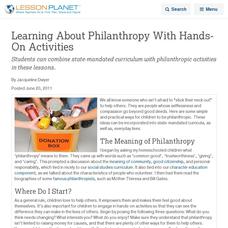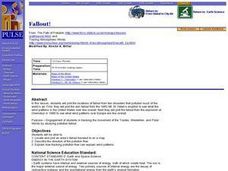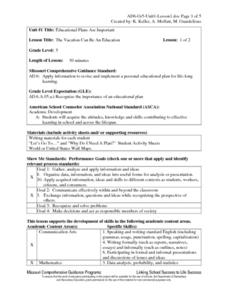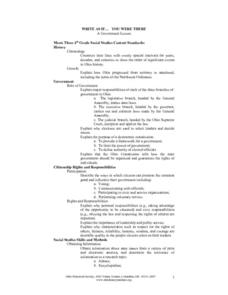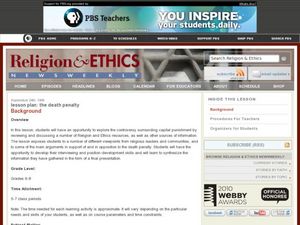Curated OER
Learning About Philanthropy With Hands-On Activities
Students can combine state-mandated curriculum with philanthropic activities in these lessons.
Curated OER
Fallout
Students view a short film about the results of dropping the atomic bomb at the end of World War II. They research controversies surrounding the use of the bomb and nuclear weapons. They write two editorials about the issue.
Curated OER
Getting Caught In The Web
Sixth graders brainstorm the ways a person's actions can affect a community. As a class, one classmate is given a ball of yarn and pass it along to another student creating a web. Next, some classmates are asked to drop their part and...
Curated OER
Silly School vs. Super School
Students explore the importance of classroom jobs. They observe a puppet who is irresponsible and never gets her work completed and then discuss whether or not this puppet should be given a classroom job. As a class, they examine the...
Curated OER
What Does Respect Look Like in School?
Fourth graders discuss why everyone needs and wants to feel respected. As a class, they share what respect looks like and what disrespect looks like. They pretend they have to leave their most valued object with a secret agent and what...
Curated OER
Goal-Makers Win the Game!
Fifth graders are introduced to the meaning of the word "goal". As a class, they identify examples of goals with their teacher's guidance. Individually, they complete a worksheet to identify their short and long term goals and complete a...
Curated OER
The Impact
Students study inventions and how they have impacted us. In this investigative lesson students study the history of two inventors then pretend that they are an inventor.
Curated OER
The Vacation Can Be An Education
Fifth graders are given a worksheet in which they choose a location they would like to visit. As a class, they brainstorm a list on what needs to be done before they go on their trip and why it is important to have a plan. To end the...
Curated OER
Red Hot Resume
Students listen to a "Help Wanted" story, paraphrase the story, and discuss vocabulary. After reading the story again, students complete a worksheet replacing the vocabulary words with their own words so that the story makes sense to them.
Curated OER
Analyzing My Path to Success
Seventh graders review their graphs from the previous lesson about trends. Individually, they identify their personal strengths and weaknesses when it comes to being successful. To end the lesson, they use this information to write a...
Curated OER
Words Can Hurt: King Day (4th)
Students study stereotypes and write about how to end stereotyping. For this stereotypes lesson, students study a T-chart about boys and girls stereotypes. Students then discuss stereotypical phrases. Students discuss Martin Luther King,...
Curated OER
What is an American?
Students create a collage in groups that illustrates what it means to be an American. In this being American lesson plan, students compare different kinds of families and present their collage and describe what it means to be an American.
Curated OER
Developing Kids with Character Through Service Learning
Young scholars discover service learning and how it can help them build character. For this community lesson, students brainstorm ways they can assist their classmates with problems, and write about it in their journal. Young...
Curated OER
Write As If...You Were There
Fourth graders use their imagination to create a story about being present when the Great Seal of Ohio was designed. They draw a picture of the Great Seal of Ohio.
Curated OER
Ohio's U.S. Presidents
Fourth graders investigate the state of Ohio's claim to be the "Mother of Presidents." Nine U.S. presidents were from the state and their contributions and terms of office are examined in this lesson.
Curated OER
Conscience and Public Service
Students study conscientious observers (COs) in the Civilian Public Service (CPS) during World War II. They explore how the media sources influence public opinion and policy makers, and complete a writing assignment about the topic.
Curated OER
Influencing the Agenda: The Impact of Interest Groups on Policy Making
Students examine the role of interest groups and how they affect voters. In groups, they research how the groups have affected policy making in the county. They examine a specific issue and discover whether or not a vote was changed...
Curated OER
Social Protections and the European Union
Sixth graders take on the role of social welfare systems in the European Union. In this European Union (EU) instructional activity, 6th graders discover social programs in the EU and compare them to the social programs in the United...
Curated OER
Lesson 2: The Story of Flagstaff
Students, in groups, write and perform a skit that retells the story of the flooding of Flagstaff.
Curated OER
Inhale the Colour of Life
Pupils view examples of portraits noting how the colors used make them feel. Using the same portrait, they redo them using different colors and then compare and contrast the first painting and second one in regards to how it makes them...
Curated OER
The Death Penalty
Eleventh graders perform a study of the rights guaranteed by the Bill of Rights and focus on the protection against cruel and unusual punishment in the Eighth Amendment as it relates to the death penalty. Prior to formulating a...
Curated OER
Is the media aiding Global Peace when reporting on religion?
Students play 'telephone' to simulate communication difficulties. In this media analysis lesson, students read and analyze newspaper articles related to religious tensions between the Pope and Muslims. Students evaluate the...
Curated OER
Martin Luther King Jr. and Nonviolence
Learners explore a local seat of government to examine ways to make changes in their communities. In this local government lesson, students read about Martin Luther King, Jr. and his nonviolent protests. Learners read important dates and...
Curated OER
Search for a Safe Cigarette
Students review a range of federal and state actions on tobacco issues and consider the government's role in public health. They discuss current labeling and how the law should interpret it.
